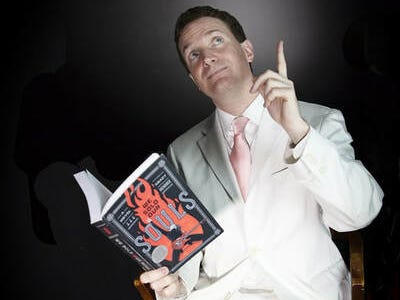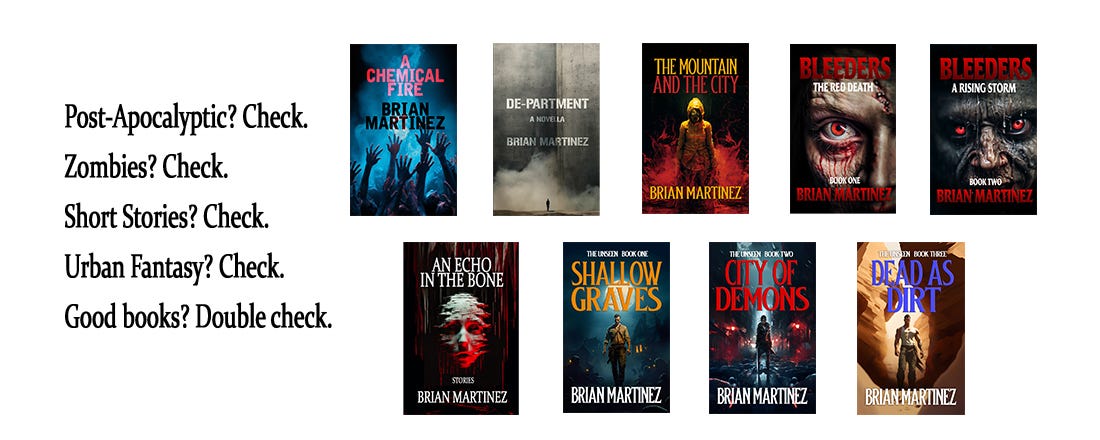Grady Hendrix is a nice monster.
In his time on Earth he's written about yetis, parasites, mad scientists, hauntings, demonic possessions, and the almighty Satan himself, yet he's also an honest, hard-working writer who is beyond generous with his time. He's one of the founders of the New York Asian Film Festival, run by Subway Cinema, a nonprofit organization dedicated to the exhibition and appreciation of Asian film culture, of which he's the Board President. He even moderates r/horrorlit on Reddit in his spare time. For all intents and purposes, he's a man who does what he loves, not because someone pays him to, but because he loves to do it.
He's also a heavy researcher who borders on the obsessive. Then he crosses the border. To write My Best Friend's Exorcism, a book set in the Eighties, he amassed stacks of old TV schedules and teen magazines. He kept charts on his wall with the weather for corresponding dates. By his own count he read more than two hundred books, at times finishing up to six a day, during the writing of Paperbacks from Hell: The Twisted History of '70s and '80s Horror Fiction.
You'd be hard pressed to find a bigger fan of horror books and films than Grady Hendrix, and yet he never loses sight of the ridiculousness of it all. His novels explore the more banal aspects of horror, those places where real life collides with the supernatural. Dead end jobs meet demonic entities. Children of divorce meet the Elder Gods. The man set a ghost story in a haunted IKEA, for god's sake. This is terror for Reality Television. Creeping dread as captured by social media. In yet another act of generosity, he answered a few questions for me.
First thing's first: what research is currently consuming you?
Right now I’m working on a book about parents, and that’s been a huge stretch for me, since I don’t have kids. I’ve been sweating blood, interviewing people I know who have kids, reading parenting books, all that jazz. It’s mostly about Southern housewives, so I’m learning all about china patterns, and home decorating tips, and gardening, and how book clubs work. It’s been like going to nice lady boot camp.
How important is humor to you? Can you imagine writing without it?
I don’t think the books I write are funny. I mean, I get that people think they are, but I take them deadly serious when I write them. So when people start telling me they’re funny it always takes me by surprise. I think what people find funny in my books is that I try to make horror realistic, and when you apply the reality principle to horror, a lot of things look totally ridiculous. But, I mean, if you’re having a black mass, someone’s probably going to be serving snacks. If you’re lost in a haunted house, someone’s probably going to be instagramming the whole thing right up until the moment they die. That’s real to me.
You've said that horror was originally a women's genre, due in no small part to classics from the likes of Mary Shelley and Shirley Jackson. Are there any female horror writers you love at the moment? Do you think horror can win back the women it lost?
The Nineties was when horror won back the women it lost in the Eighties. Conventional wisdom says that horror died in the Nineties, but actually it grew up. Shows like The X-Files, Buffy, Charmed, and Angel taught a whole new generation of fans that horror could be romantic, or funny, or scary without being gory. The kids who grew up on those shows are the ones creating the best horror now. In terms of female authors who should be more celebrated, Vernon Lee is the lady version of Henry James, only without the constipated sentences. Amy Lukavics is doing some weird stuff in YA horror that’s worth looking at. And I’m working with Valancourt to bring Elizabeth Enstrom and Bari Wood back into print under the Paperbacks from Hell banner.
There's been a boom of nostalgia lately, which books like My Best Friend's Exorcism and We Sold Our Souls tap into. Do you think this is a product of how overwhelming and confusing the world has become, that people are avoiding reality? Follow-up question: why were the Eighties so awesome?
I don’t think the Eighties were all that awesome. I lived through that decade and mostly I remember being scared we were all going to die in a nuclear war, and feeling like the world had collectively lost its mind over the Satanic Panic. I write books set in the past because I’m an idiot who can only write what he knows, and that’s when I grew up. So if I’m going to write about high school it needs to be set in 1988, because that’s when I was in high school.
Your book Paperbacks From Hell reads like a love letter to pulp horror books. Do you wish those books were more popular, or is part of their appeal the way they've been overlooked and underestimated?
I only discovered those books because they had been overlooked, so that was definitely part of the appeal to me. I don’t want to swim around in other people’s bath water, so the fact that this corner of the tub was mostly unoccupied really encouraged me to dive in and splash around. And there are still hundreds (well, okay, dozens) of amazing authors out there who haven’t gotten their due. At this point, enough time has passed where we can really separate the trash from the flash. So I think those books need to have their time in the sun and start entering the canon and becoming modern classics now that we have a better perspective on them. I don’t want them to be hidden underground anymore. That only serves a tiny minority of hipsters. I want the world to appreciate these books.
Do you think there's any similarity between the boom of pulp fiction in the Seventies and Eighties and what's been happening with e-books the last ten years? Can we learn anything from pulp's demise?
I don’t know enough about the e-book boom over the last decade, but I’ve had the same thought. I wish someone was out there curating the thousands of e-book titles popping up all over the place every month.
Finally, Paperbacks From Hell has inspired Valancourt and Quirk to purchase and reissue a number of out-of-print horror titles. Do you feel a sense of responsibility to the writers of those books? Are you at peace with what you've wrought upon mankind?
I feel an enormous sense of responsibility to the authors and the cover artists. These people worked hard at what they did and infused their books and paintings with an enormous amount of emotion and technique. And then there’s J.N. Williamson. But everyone else really bled for their art, and I want their names to be remembered and celebrated. They’re more than just weirdos writing kooky horror books, they’re authors writing about the pain, and grief, and love, and joy, and Nazi leprechauns they’ve experienced in their lives, and more people should read them.
Grady Hendrix's novels include Horrorstör, My Best Friend's Exorcism, We Sold Our Souls, The Southern Book Club’s Guide to Slaying Vampires, and How to Sell a Haunted House. He also wrote Paperbacks From Hell, a non-fiction study of 70's and 80's pulp horror, as well as co-wrote the period horror film Mohawk.





Great interview. I love Grady’s style of writing.
What a great, humble dude. You must have had fun with this interview! I'm glad to have been introduced to him through your work, so thank you!